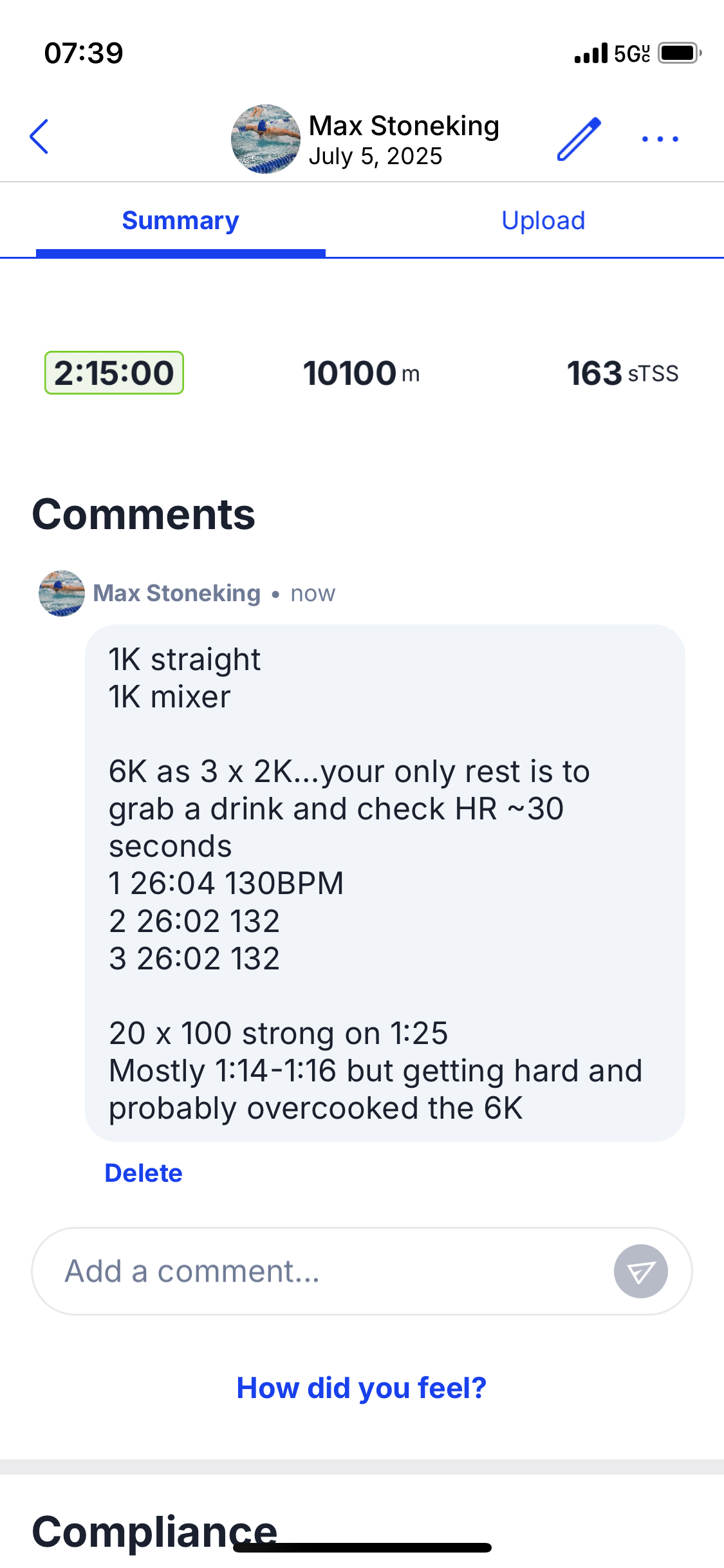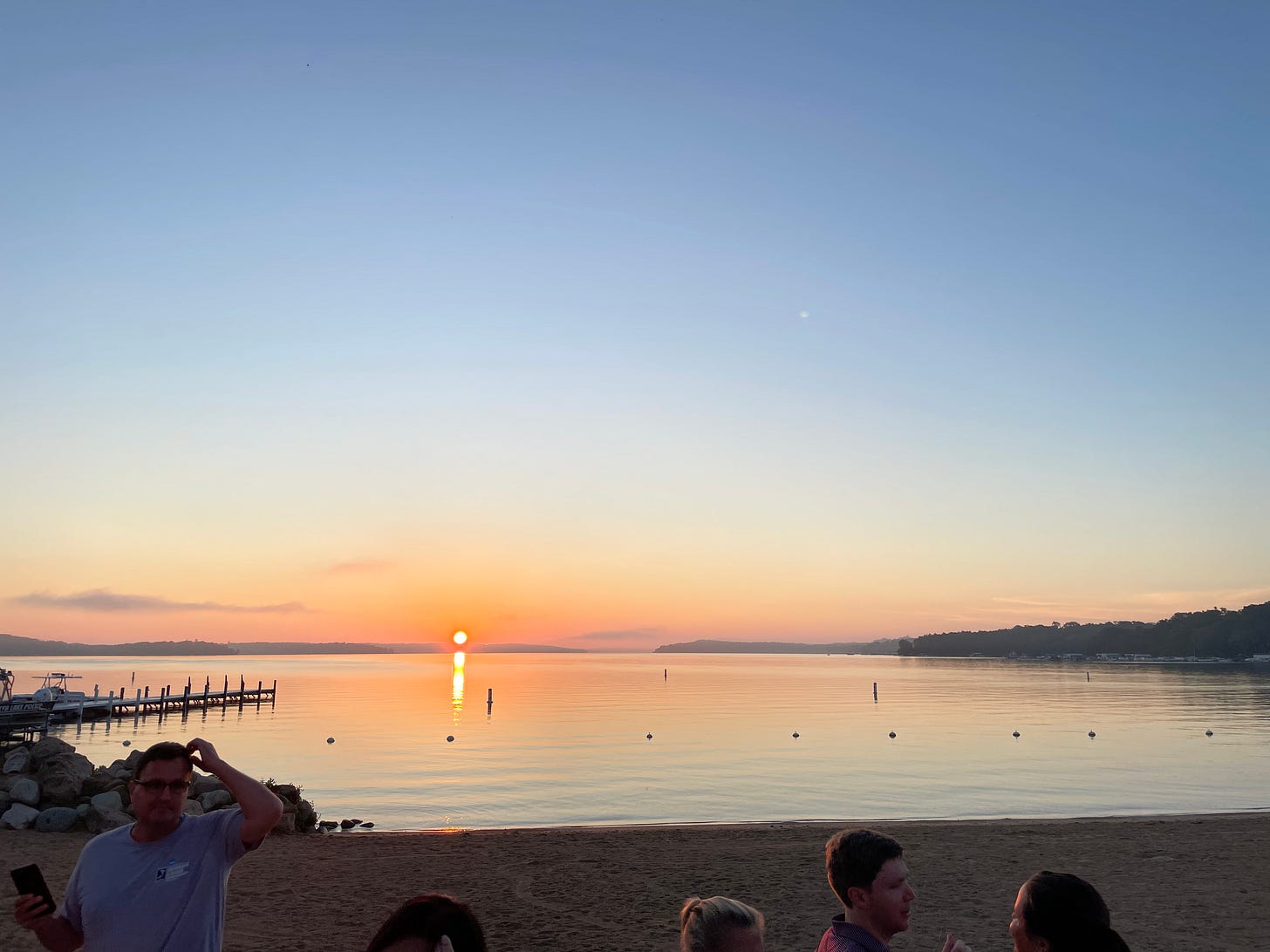It is coming up on a year since I lasted entered, trained, and competed in an endurance event. A year is a long time and short time all at once.
For those unfamiliar, I ran myself over the edge with triathlon and other life forces last year. You can read more about that below:
It took quite a while to reframe the way I look at competition, training, and sport. November and December of 2024 were some rough months. When you create physical damage, something needs to change whether it be mindset, environment, or training distribution. That change was a self-imposed hiatus on from triathlon for the 2025 year as I am not yet confident that I won’t take it too far.
But like most of my endurance friends, complete removal of the activities I enjoy most would be a mental blow. Along my path to recovering mental and physical health, I never stopped swimming. Even on the worst swim days, I can think through a lot of the things that are on my mind. It has been that way my whole life. The pool is a familiar place for me given I have swum most days since I was 7 years old.
As the spring turned to summer, I began to notice I was not swimming too bad and had put on a little more muscle up top that allowed for some better propulsion in the water. I’m not fast by any means, but it inspired me to sign up for The Swim of Legends in Lake Geneva, Wisconsin. This is a point to point, 8-mile, open water swim, and was a new challenge that allowed me to go have fun and enjoy a challenge. No expectations or pressure to perform at a certain level.
As always with my race recaps, I’ll take you through through the training in the lead up and then illustrate the scene from race day. We’ll split it into two parts:
Part I: The inspiration and training
Part II: The race itself
The inspiration
Lake Geneva is a place of fond memories. We used to go there all of the time when I was a kid for lake days. The water is clear, it is a nice lake town, and a perfect location for a marathon distance open water race. Hats off to John Ejnik and Todd Bequette for organizing this inaugural event. The Swim of Legends was legendary.
The training
When I signed up for the race ~9 weeks out, I knew I had a solid base of fitness in the pool. I typically hit a minimum of 20,000 meters give or take nearly every week year round and have since my college swimming career came to an end in 2021.
What I lacked was the specific fitness to handle long, uninterrupted bouts of swimming. I also lacked the patience required to execute longer swim intervals.
“Just because you can swim faster does not mean you should.”
This quote applies quite well to an ultra distance swim and the training required to prepare for it. Pacing it 1-2 seconds per 100 meters too hot can be the difference between finishing well and blowing up. There is a fine line and riding this line in training took some practice. Unfortunately, I did not have great access to open water, but I have a great pool to train in every day and this was enough.
I should also mention that I kept a minimum running frequency during this time as running is enjoyable for me and my legs needed something to do.
A basic week in the pool was as follows—
Monday/Wednesday/Friday:
3-3.2K easy technique swim with some fast 25s and 50s
Gym session on Wednesday
Tuesday
Quality swim ~4.5-5K with 400/800 meter pace work
Thursday
4.5-6K aerobic swim depending on the week
Saturday
Long swim 7-10K with sustained intervals at race effort
Gym session
Sunday
1500 easy float to stay in touch with the.water. Outside and in the sun! Perhaps the most fun day of the week!
This totaled to roughly 28-30K each week. Probably lower volume than ideal for the event demands, but with some run training in the mix, it was likely fine. To give this a proper go, all non-swim activities would need to be taken out and swim volume would benefit from being a little higher.
Saturday long session
This was the staple in the training diet across the weeks. I started with a modest 7.6K in the first week and was surprised at how taxing this was. This was the longest swim I had done since college, so it may have been more mental than anything.
This long day eventually became enjoyable. 1:18-1:20 per 100 meter on intervals from 1500-3K became manageable. 2K intervals were the sweet spot. The fitness and confidence was building and the keystone session, pictured below, made me realize I could at least survive the 8-mile swim.

This type of work was incredibly boring, not that hard (if paced right), but essential to setting the right expectations.
Fueling
I hate to talk about fueling because it seems everyone and their mother uses it as “the thing” that helped them get a good result. It is important, but your training matters more.
Nonetheless, there was also a need to practice fueling in these sessions. For a swim that is 60-90 minutes in length, a good breakfast before and plain water during is going to be plenty. But these longer swims were 2-2.5 hours. Swimming is also a sport where body position can make it hard on the stomach to push fluids through be it that you are horizontal, so training the gut is important.
I played around with a few strategies but found that a high carb breakfast and about 60-80g total across the session was enough. These were pretty low intensity swims so I was not chewing through glycogen, but keeping a good baseline blood sugar was probably a net positive for recovery. It also gave me ingestion practice for the main event which we will cover in Part II.
Speed
I talked with a fellow open water competitor soon after I signed up and told him that 1:15-1:17 per 100 meters seemed quite easy, but even a few seconds faster, 1:11-1:12 was about my terminal limits where the clock was ticking before I blew up. Swimming can be tricky in this regard.
He told me that the big base swims paired with some speed work would help me bust through those terminal limits. He was right. On my weekly 400/800 pace session, I found 1:09-1:10 pace to be more manageable than in the past 18 months. I also found that I could crank down to this pace after some endurance work instead of being stuck in 3rd gear.
My swim form in 2023-2024 really fell off, and this rekindling of fitness was most likely due to just focusing some more on swimming. However, I do think the intensity distribution was helpful.
Across the ~9 weeks, I completed 65 swim sessions and suspect that most of the days that were a struggle were more mental fatigue than anything. Every session was solo in short course meters and there are no strong swim groups accessible near me at the moment with my work schedule. This may be something to explore in the future.
I may also try to get access to a long course pool or do more open water to mix it up.
This approach worked fine for a first try, but it was evident that I was underprepared for the task at hand. The wheels fell off, predictably, at 10K.
We’ll dive into that next week in Part II after I have thought about it some more.
Stay tuned, folks.



